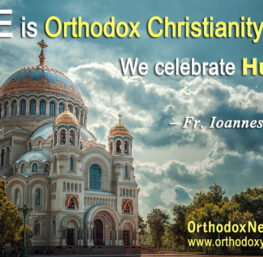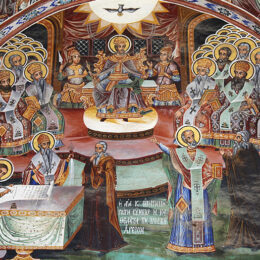Chronicles Magazine | Srdja Trifkovic | Dec. 3, 2007
A nation’s cultural space is marked by its spiritual fruits and not by the frontier posts. It is possible to maintain a cultural space devoid of territory (the Jews). It is also possible to lose that space under the auspices of an ostensibly functioning state—and nominally still a nation-state at that!—as is happening in today’s Western Europe. The Serbs are currently facing an ongoing reduction of their physical space to the point where the reliquiae reliquiarum of their demographically exhausted state will comprise only those lands on which nobody else can establish any kind of claim.
They are also facing a simultaneous Western demand to accept and absorb postmodern cultural matrices in order to prove their fitness for the allegedly desirable political and economic integration into “Europe”—which is constantly used as misleading shorthand for the European Union.
The upholders of postmodernia see continued existence of a distinctly Serb cultural space, based on pre-modern assumptions and sensibility, as an unpardonable anachronism and a source of potential future contagion in those lands (Germany, Sweden, or Holland, for instance) where the grand Gleichschaltung has been completed. No defiant village that remembers old songs and myths, that remembers ancestors and celebrates old battles, is allowed to remain in the shadow of Euro-legions.
In the meantime, Europe of the old EU “core” is rapidly morphing into the cultural wasteland in which historical amnesia and esthetic relativism are promoted to the detriment of creativity: there is no French writer worth reading today, no Dutch painter worth sponsoring, no German composer worth hearing. If the process is so far advanced in those countries that used to define “the West” or “Europe,” the promoters of the Frankfurtian Long March rightly hope that Serbia, too, will relent and replace her obsolete and oh-so-dangerous mythical consciousness with a new, global one. They claim that only by discarding the burden of their mythologized history, and the illusion that they are in any way special—except, perhaps, in the magnitude of their crimes— can the Serbs become “normal” and cease to be a danger to their neighbors and to themselves. Only de-Serbianized can they embark on the road to “Euro-Atlantic integrations” and “start living like all other normal people.”
Blissfully unaware of the cultural tectonic shift that has taken place in “the West,” many Serbian political leaders, analysts and institutions in their contacts with the Western elite class keep invoking four sets of arguments in support of their position that Kosovo ought to remain part of Serbia:
1. Historical: Kosovo was the heartland of the Serbian medieval state;
2. Cultural: in Kosovo there are many priceless monuments of Serbian art and architecture that define Serbia’s contribution to the common European heritage;
3. Spiritual: Kosovo is “Serbia’s Jerusalem”;
4. Civilizational: Kosovo should not fall to the insurgent jihad.
The irony of the Serbian predicament is that they still imagine they are talking to the Westerners of another era, the era that had produced Nixon and Reagan, de Gaulle and Mitterand, Adenauer and Schmidt, Rebecca West and Alfred Sherman . . . and others of the generation born between, roughly, in the quarter-century before 1920, with whom such arguments could be reasonably expected to resonate.
The problem is that they are all dead, and have been replaced in the positions of political and cultural influence by the new, post-modern breed of Westerner. He is distinguished from his predecessor exactly by rejecting the value and importance of the historical, cultural, spiritual, and civilizational legacy of our common civilization.
These new ruling elites of Western Europe and North America have nurtured a number of fatal weaknesses in their own societies, including both the primary cause—which is the loss of Christian faith—and a number of secondary ones, including hostility to all forms of solidarity of the ethnically European and traditionally Christian communities based on their common ancestry and culture; the loss of a sense of place and history; rapid demographic decline, probably irreversible and unparalleled in history; rampant Third World immigration, especially from the Islamic world; imposition of “diversity,” “multiculturalism” and “sensitivity” that promotes alien cultures and lifestyles to the detriment of traditional European, Christian models; and last but by no means least, demonization and criminalization of any opposition to the above.
To the postmodern Western mindset, those who argue that they should be entitled to keep a land because they have a centuries-long historical bond to it, because their ancestors had built lovely Christian churches in it, because its heritage underpins their moral code and spirituality based on Christian martyrdom, and because they are defending themselves against an aggressive and resurgent Islam . . . anyone who makes those argument is unconsciously arguing—in the eyes of the new elite—in favor of having that territory taken away. The Serbs’ arguments—especially when presented eloquently and logically—only prove that Kosovo and Metohija must be detached from Serbia permanently as that is the only way to cure Serbia from such unhealthy, “un-European” atavisms. Whatever is said to support the historical, cultural, spiritual and civilizational right of Serbia to Kosovo is received among the Western elite class as yet further proof why Kosovo must be given to the Albanians, who, by virtue of being overwhelmingly Muslim (of the allegedly “moderate” variety) are perceived as perfectly natural allies of the Western elite class.
To explore the self-hate and the related Islamophilia of the Western elite class there is no need to dwell on the hypocrisy and outright criminality of the Western policy in Kosovo, Bosnia, Chechnya, Cyprus, and other hotspots where Islam confronts traditionally Christian communities. Let us look instead at the manifestations of the Western elite class’s pathology in their own countries, or—to be more precise—in the countries over which they rule but to which they no longer feel any natural bond of kinship and obligation.
The present technological, cultural and financial strength of Europe is a façade that conceals an underlying moral and demographic weakness. Its dynamics have the potential to eventually destroy Europe before this century is over. The symptoms of the malaise go hand-in-hand with the expansion of the European Union, a transnational hyper-state that replicates, within Europe, the elite mindset prevalent in the United States.
Europe’s demographic self-annihilation is a phenomenon of world-historical proportions. The collective death wish, epitomized by the Pill, abortion, deviant sexuality, promiscuity, and euthanasia, means that Europe’s population has aged to such a degree that it will continue to shrink even in the unlikely event that birthrates rebound to replacement level. On current form, by the end of this century there will be no “Europeans” as members of ethnic groups that share the same language, culture, history, and ancestors, and inhabit lands associated with their names. The shrinking native populations, in the meantime, are being indoctrinated into believing—or else simply cajoled into accepting—that the demographic shift is actually a blessing that enriches their societies. Europe is losing the ability to define and defend itself, to the benefit of unassimilable multitudes filled with contempt for the host-society. One consequence is that active Jihadist networks now exist in every country west of the former Iron Curtain.
. . . more




It’s almost unreal that this article brought me back to (about 1976 or 1975, or 1977) when I last visited Bruxelles and their famous Grand Place gold plated building facades around a large plaza in the heart of the old town. A few decades later I remember having that same vision whan Monty Python’s John Cleese was trying to outdo Eric Idle by naming “the worst thing on Earth”. Idle said “it has to be squash”, Cleese replied “I’ll do you one better – it’s Brussel sprouts” – Idle re-replied “Excellent, I’ll do you one better too – it’s anyghing from Belgium. In some strange way it reminded me that in spite of the visual splendor I witnessed there was nothing else in the whole of Belgium except the ferry I took to Dover England. This article equally reminded me of the vast nothing (emptiness) of most things “Western” same as in the recent decades we invented the “metrosexual” – who is neither straight nor gay, nor a threat to any woman, nor attracted to any woman – another form of being tied to Belgium. The entire present EU reminds of a communist word from the Slavic languages “uravnilovka” – next to impossible to translate but in broad strokes it is a trap for making everybody and everything even (leveled) similar to “affirmative action in the United States” – where you have to hire “minorities” no matter what the actual needs or what profit/loss statement dictates. It’s just about equally stupid and equally pointless. There are no more passions, there are no more French berrets, no more French cognac, German beer, English fish and chips, the future becomes much worse than Geogre Orwell ever predicted, and I don’t like it one bit. Yes, much of the article deals with the issue of Kosovo’s proper heritage and the unalianble Serbian right to the birthplace of their nation and nationality – creed, beliefs, religion, etc.
However in my view this illness is going to turn out to be a lot more costly for the entire continent of Europe while Serbia will become a land of the dispossessed persons wandering train stations of Garre du Sud, Victoria Station, Wiener Hauptbahnhoff, etc.